- Home
- Terri Blackstock
Word of Honor Page 2
Word of Honor Read online
Page 2
Chapter Two
The ambulance at Midtown Fire Station pulled out of the driveway first, just moments after the explosion six blocks away. The firefighters, who had just settled down to a lunch of shrimp gumbo, headed for their turnout pants.
Dan Nichols stepped into his rubber boots and pulled the pants up. As he snapped them shut, he grabbed his turnout coat and helmet. “Where’s the fire?” he yelled as George Broussard, already decked out, jumped onto the pumper truck.
“Post office,” George answered. “Explosion of some sort.”
“Felt like next door!” Dan got into the truck. As the siren came on and Mark Branning pulled the truck out of the bay, Dan peered up through the windshield. The black smoke from the explosion just six blocks away had already made its way down Purchase Street and was billowing up into the sky, visible to everyone.
“Mail bomb?” Dan asked.
“Probably,” Mark said.
As they rounded the corner and reached the block where the post office was, all three of the firemen on the truck went silent.
Dan had never seen anything like it. The roof and two of the walls were gone, and the walls left standing were consumed in flames at least twenty feet high. Fallen electrical wires sizzled and sparked. Dan dreaded the idea of digging through live wires and burning rubble to get to any bodies that might be under it all.
The ambulance was already there. Issie Mattreaux, the paramedic, climbed from the truck, joined by Bob Sigrest, an EMT.
Dan jumped out and waved to them. “Stay back!” he commanded. “Stay with the ambulance!”
They nodded, understanding. Since the ambulance squads weren’t equipped to head into heavy smoke, it was up to him and the other firefighters, also trained as EMTs, to find any survivors.
Dan snapped down his face shield and pulled on his air pack. He pulled the gauntlets of his sleeves over his gloves to protect his skin, but he could already feel the skin-melting heat of the explosion, heavy on the July air. He wondered how any of them would make it through this. The breathing tank weighed thirty to forty pounds, a lot to carry when they were digging through bricks, steel, and glass. It had only about twenty minutes of air, not nearly enough for a job like this. They’d be swapping tanks left and right for the next few hours. He hoped the 911 dispatcher had radioed Slidell to send backup crews.
“Here! Help, here!”
Through the haze Dan spotted Penelope Houston, the owner of the drugstore across the street. Her face was smoke-stained, and she was coughing. Wildly, her arms gestured toward a body on the ground. A child, Dan realized, his heart jolting. He ran to the ambulance. “There’s a child! Give me the megaduffel! He’ll need oxygen.”
Issie thrust the equipment at him, then handed Mark the spineboard and pediatric collar. Grabbing the gear, they took off into the smoke.
The child looked tiny on the scorched pavement, and he didn’t seem to be breathing. He had been thrown in the explosion. Blood pooled on the ground from a wound on the back of his head, and his body was covered with glass and soot.
Wasting no time, they got the neck splint on him, slapped the oxygen mask on his face, and carefully moved him onto the board. Then they ran him back to the ambulance. “He’s not breathing!” Dan yelled. “And he’s got a bad head wound.”
Even as he spoke, Issie began running a tube down the child’s trachea to clear his airway. Dan fought the urge to watch to see if the soot-covered boy would live. Already, Mark was going back into the smoke to look for more survivors. Dan grabbed Penelope Houston. “Penelope, do you know of any other survivors?”
Penelope’s face was streaked with smoke and tears as she babbled hysterically. “I heard the explosion, Dan.” She coughed. Her voice was cracked and broken. “It shook the building and knocked my windows out. I…I come out and seen…all the smoke and flames…and this little boy was layin’ here like he’d been throwed. I didn’t see nobody else.”
The town’s other ambulance unit was just arriving, along with a convoy of other fire trucks and rescue units from neighboring towns. Dan waved for Steve Winder as he got out of the rig. “Steve, get her on some oxygen and out of this smoke!”
Steve tried to usher her back to his unit as Ray Ford, the fire chief, pulled to the curb between two of the trucks. He was dressed in full gear, face shield down, as he approached Dan. “Anybody inside?”
“Of course there was somebody inside!” Penelope shouted, turning back from Steve’s ambulance. “Sue Ellen Hanover was there. And Cliff Bertrand. They’re always there. They never leave, not even for lunch!” Again, she surrendered to a series of coughs.
“So we need to look for Sue Ellen and Cliff,” Ray shouted. “How many cars in the parking lot?”
“Looks like a couple,” Dan said.
Stan Shepherd, the town’s only detective, came running up to the ambulances. “What in the sam hill—”
“Those cars could be Sue Ellen’s and Cliff’s,” Ray cut in. “Who’s the kid?”
Still coughing, Penelope turned around and shouted back, “That’s Mary Hampton’s boy. They were in the drugstore before they went to the post office.”
Stan swung around. “Are you sure? Mary and Pete?”
“You know them?” Dan asked.
“Yeah,” Stan said. “She goes to our church. Divorced. Some of the guys put a new roof on her house last year.” He went to the ambulance and looked down at the boy as Issie struggled to stabilize him. “Pete’s five years old. I’ve taken him to a couple of Saints games. Where’s his mother?”
“He’s all I’ve found so far,” Dan said. He closed the doors of the ambulance to keep the smoke out, and ignored the stunned look on Stan’s face. “Get out of the smoke, Stan. Keep everybody back.”
As Stan ran to where they were setting up a barricade at the end of the street, Dan headed back into the heat to look for any survivors. But even as he did, he knew that there wouldn’t be any. No one would have survived this blast. It was a miracle that the boy was still alive.
Chapter Three
Celia Shepherd had been shedding a lot of hormonal tears lately, and she suspected it would get worse as these last three weeks of her pregnancy passed. But the news of Mary Hampton’s death, and the deaths of Sue Ellen Hanover and Cliff Bertrand, had sent her over the edge of her emotional precipice. She hadn’t been able to stop the tears for Pete, the funny little boy in her Sunday school class. The thought that he had been orphaned in the space of a moment was too much to bear.
So she had gotten into her car and headed to Slidell, where he’d been transported. Pete’s father had run off with his secretary two years earlier, and the boy had undergone quite a bit of emotional upheaval since then. No one knew where the father was, or how to reach him. And his grandmother, who had been living with them, had recently gone to live with her son.
The child was incredibly alone.
Celia’s tears streamed down her face and she wiped them away as she drove. She set her hand gently on her pregnant belly and felt her own child kick within her. What a terrible thing it would be to leave your child behind. What a horrible nightmare for a little boy, to wake up from an accident and learn that the person he loved and needed most in the world was gone.
Trying to see through her tears to drive, she picked up her cell phone and dialed out her husband’s number at the police department. “Stan Shepherd, please.”
“Celia, Stan ain’t in.” She recognized the voice of LaTonya Mason, the rookie cop who did desk duty. “He’s still at the post office. I’ll leave him a note that you called.”
“Just tell him I’m going to the Slidell Hospital.”
LaTonya gasped. “The baby?”
“No, no. I want to go see about Pete Hampton-the little guy who was in the explosion. Just tell him he can get me on my cell phone.”
She clicked the phone off, then dialed her Aunt Aggie and waited for the old Cajun woman to get to the phone. “Hola?”
“Aunt Aggie, it�
��s me,” she said. “Did you hear about the post office?”
“Hear ’bout it?” Aunt Aggie asked. “Near wet my pants when I heard that bang. And the smoke…it’s still arrywhere.”
“Aunt Aggie, Mary Hampton was killed, and her little boy was injured…”
“The little blonde, T-Celia?” The Cajun prefix was a shortened version of petite, her version of “little Celia.” Aunt Aggie had called her that since she’d been a child.
Celia sniffed and wiped her tears. She could hardly see through them to drive. “Yes. The one in my Sunday school class. The one you said would be a heartbreaker someday.”
“Celia, don’t tell me—”
“It was him,” she cut in. “His mother’s dead, Aunt Aggie. And he’s pretty badly injured. I just wanted to let you know I’m heading for Slidell to be with him.”
“You okay, sha?” Aunt Aggie asked, using her drawled form of chere.
“I’m fine,” she choked out. “I just can’t believe they’re all dead. Mary and Sue Ellen and Cliff.”
“They got the crazy yet?”
“I don’t know. I haven’t been able to talk to Stan. Oh, pray, Aunt Aggie. Pray that they catch the person who orphaned that little boy.”
Aunt Aggie paused for a moment. “You sure you don’t want me comin’ with ya?”
“I’m halfway there already.”
“You take care of your baby, you hear? That little boy’s gon’ be all right.”
“I’m fine,” Celia said. “He doesn’t have anyone, Aunt Aggie. I have to go help. At least until his grandmother gets back to town.”
“You could try findin’ that no-count daddy of his.”
“He hasn’t been heard from since he left them. I doubt seriously he’ll turn up now.”
“You might be surprised,” Aunt Aggie said. “If he knew his wife was dead.”
“I wouldn’t have a clue where to start. Anyway, I’m almost there, and I’m fine, so don’t worry about me. I just wanted to let you know.”
“Okay, sha. You be careful, hear?”
Celia hung up the phone as she reached the outskirts of Slidell and checked her watch. The boy would have been here about half an hour by now. She wondered if anyone had notified his next of kin. She wondered if they even knew how.
She began to weep again, and not knowing what else to do, she picked up the cell phone and dialed out Nick Foster’s number. He was the preacher at her church—a bivocational pastor who worked part-time as a firefighter. She had no idea if he was on duty right now. Even the off-duty firefighters were, no doubt, still working on the fire at the post office.
His voice mail picked up. “Your call is very important to me,” he said, and she knew he meant it. “Please leave your name and number and I promise I’ll call you back as soon as I can.” She waited through the series of beeps that testified to the number of messages he had waiting already, then after the long beep added her own. “Nick, it’s Celia. I just wanted to let you know that I’m headed to Slidell Hospital to be with little Pete Hampton. If you get a chance to come over there, would you do it, please? I’m kind of at a loss as to how to deal with things. I know it would help the relatives if you were there when they get there, and Mary’s mother really likes you. Not to mention Pete.” Her voice trailed off, and she cut off the phone and wiped her eyes again. What in the world was she going to say to that little boy? What in the world could she do for him?
She reached the hospital parking lot and parked near the emergency room. She hurried in to the receptionist booth in the ER.
“Maternity?” the receptionist asked through the glass.
“No,” she said. “I’m looking for Pete Hampton. The little boy who was brought in from the explosion in Newpointe.”
“Are you his mother?”
“No.” She swallowed, and her lips trembled as she said, “His mother was killed in the blast.”
The receptionist, who probably saw all kinds of tragedies on a daily basis, looked stricken. “I didn’t know. That poor little boy. Are you a relative?”
“No, but he doesn’t have anyone here, and he needs somebody. I’m his Sunday school teacher, that’s all, but I love him, and no one else here even knows him.” She broke into tears again.
The nurse peered up at her as if trying to decide whether to let her go back. Celia hoped she didn’t recognize her. She’d had a colored past, and people who remembered her not-so-distant history often looked at her as if they’d spotted Al Capone.
“Just a minute, let me ask someone.” She got up and headed through the swinging doors, and Celia began to pace in front of the window, back and forth, back and forth. This place brought back so many memories. So many close calls with death, so many friends in the midst of refining fires. All of Newpointe’s crises seemed to culminate here.
She caught her reflection in the mirror, her blonde hair and wet blue eyes, her huge belly just weeks away from delivery. Again, she looked down and patted her stomach. “It’s gonna be okay,” she whispered to her baby. “We’ve just gotta go be with Pete.”
In a moment, the nurse came back out. “The doctor said you can go back. It’s through those doors, the third door on the left.”
Celia searched the woman’s face. “How is he? Is he gonna make it?”
“He’s still unconscious,” she said.
Celia headed through the emergency room doors and down the hall until she came to the room where Pete lay on the bed, surrounded by a team of doctors and nurses. A tube ran down his throat, his face was bruised, and his eyes were swollen shut. She threw her hand over her mouth to muffle her horror. “Is he…is he okay?”
The doctor left the bedside and met her at the door. “He has a skull fracture and a concussion,” he said. “Both lungs have collapsed, so we’ve put him on a ventilator. Looks like he was thrown a good distance in the explosion. Fortunately, he was far enough away that he didn’t sustain any burns. He’s got a broken arm and multiple lacerations. He’s unconscious right now, but he did wake up on the way to the hospital and spoke. Then he slipped back into a coma. We’re running some tests to determine if there’s any swelling in his brain. We’re probably going to have to transport him to New Orleans, since they have a better equipped head trauma unit there, and a pulmonary specialist who has more advanced equipment. You’re not one of his relatives?”
“No…I’m his Sunday school teacher. His mother…” She lowered her voice to a whisper, in case Pete could hear. “…was killed.”
His face slackened. “The paramedics weren’t sure when they brought him in. Do you have any way of getting in touch with his relatives?”
“I can try,” she said. “I should have done it before now, but I wasn’t thinking clearly.”
“He may not wake up for a while. Right now, it would be a huge help if you could find his relatives. Where is his father?”
“No one knows,” she said as a wave of anger surged through her. “But his grandmother…she lived with them until a couple of weeks ago, and then she went to stay with her son because his wife had a baby. It’s so sad…because…she didn’t know when she left that she’d never see her daughter again.” She covered her eyes and sucked in a deep sigh. “Oh, what if she hasn’t been notified yet? Shouldn’t I wait until the coroner or somebody gets in touch with her?”
He touched her shoulder gently. “It’s very important that we reach her right away. We need consent forms signed, decisions need to be made…”
“Yes, of course,” she said. “Okay, I’ll do what I can. Can I…just see him first?”
“Of course.” He escorted her to the side of the bed, and she looked down at the tiny, limp body. He was a rascal in Sunday school, always asking the hard questions, delighting in everything they did. He had an imagination that never quit, and he soaked up stories of Joseph and David and Daniel like they were local heroes. She didn’t remember ever seeing him quite this still. With all the tubes and wires they had attached to him, she hardly reco
gnized him at all.
The fact that his mother wouldn’t be here to nurse him back to health overwhelmed her. She lifted his little hand. It was limp in hers, but she could feel a light pulse beneath his wrist. “Hang in there, Pete,” she whispered. “Hang in there. Don’t let go.” But even as she said the words, she wondered if, maybe, he should let go. Maybe staying in this life was going to be too tough. Orphaned, possibly brain damaged, even crippled. She just didn’t know. Was this more than a little child could bear?
She leaned over and pressed a kiss on his little forehead, then stroked his cheek gently. “You’re gonna be all right, Pete,” she said. “You’re gonna be fine. Can you hear me?”
No answer.
“Pete, this is Miss Celia. You just keep fighting, okay? I’ll be here fighting right beside you.”
There was no indication that he heard a word she said. She let go of his hand and looked up at the doctor. “I’ll go try to make some phone calls,” she said. “I know his grandmother is with his uncle. I’m just not sure what his uncle’s name is. Maybe their neighbors know.”
The doctor nodded. “As soon as we can stabilize him, we’re going to be transporting him to New Orleans where they have better head trauma facilities and a team of neurosurgeons. If they have to do surgery, they’ll need consent right away.”
“I understand. I just don’t know if I can make it through that phone call.”
“Somebody’s got to do it,” the doctor said firmly. “It’s better coming from a friend of the family.”
She took strength from the doctor’s calm, insistent gaze. Turning, she left the room to find a phone.
Four phone calls later, Celia had the name and number of Zack Lewis, Mary Hampton’s brother in Waco. She was about to dial when Allie Branning pushed through the doors to the emergency room.
“Celia, is Pete all right?”
“No,” Celia said, as Allie pulled her into a hug. “He’s not. I’m trying to reach his relatives.” She released Allie and wiped her tears. “Where’s Justin?”

 Aftermath
Aftermath Shadow of Doubt
Shadow of Doubt Second Chance - 05 - Never Again Good-Bye
Second Chance - 05 - Never Again Good-Bye Miracles
Miracles Broken Wings
Broken Wings the Cape Refuge (Cape Refuge Series Book 1)
the Cape Refuge (Cape Refuge Series Book 1) Shadow in Serenity
Shadow in Serenity Distortion (Moonlighters Series)
Distortion (Moonlighters Series) Second Chance - 02 - When Dreams Cross
Second Chance - 02 - When Dreams Cross True Light
True Light Private Justice
Private Justice Last Light
Last Light Downfall (An Intervention Novel)
Downfall (An Intervention Novel) Distortion: Moonlighters Series: Book Two
Distortion: Moonlighters Series: Book Two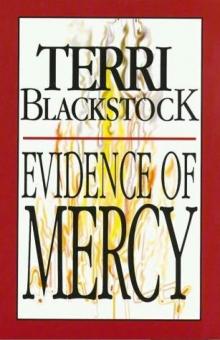 Evidence of Mercy
Evidence of Mercy If I Run
If I Run Southern Storm
Southern Storm Ulterior Motives
Ulterior Motives Emerald Windows
Emerald Windows River's Edge
River's Edge Intervention
Intervention The Heart Reader
The Heart Reader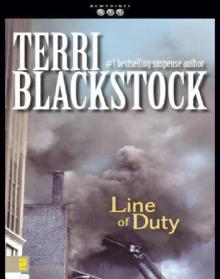 Line of Duty
Line of Duty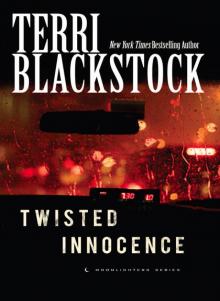 Twisted Innocence
Twisted Innocence When Dreams Cross
When Dreams Cross Downfall
Downfall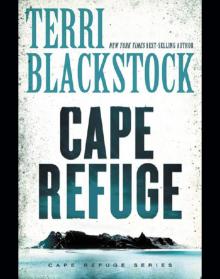 Cape Refuge
Cape Refuge Breaker's Reef
Breaker's Reef Night Light
Night Light Double Minds
Double Minds Justifiable Means
Justifiable Means Covenant Child
Covenant Child If I Live
If I Live If I'm Found
If I'm Found Vicious Cycle
Vicious Cycle Presumption of Guilt
Presumption of Guilt Trial by Fire
Trial by Fire Word of Honor
Word of Honor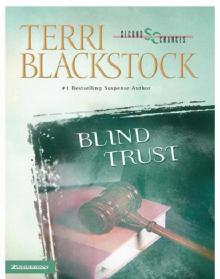 Second Chance - 03 - Blind Trust
Second Chance - 03 - Blind Trust Blind Trust
Blind Trust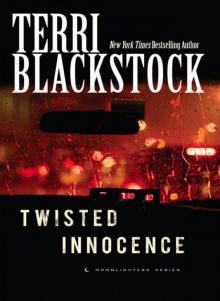 Twisted Innocence (Moonlighters Series Book 3)
Twisted Innocence (Moonlighters Series Book 3) Predator
Predator Dawn's Light
Dawn's Light Chance of Loving You
Chance of Loving You Truth-Stained Lies
Truth-Stained Lies Never Again Good-Bye
Never Again Good-Bye Catching Christmas
Catching Christmas